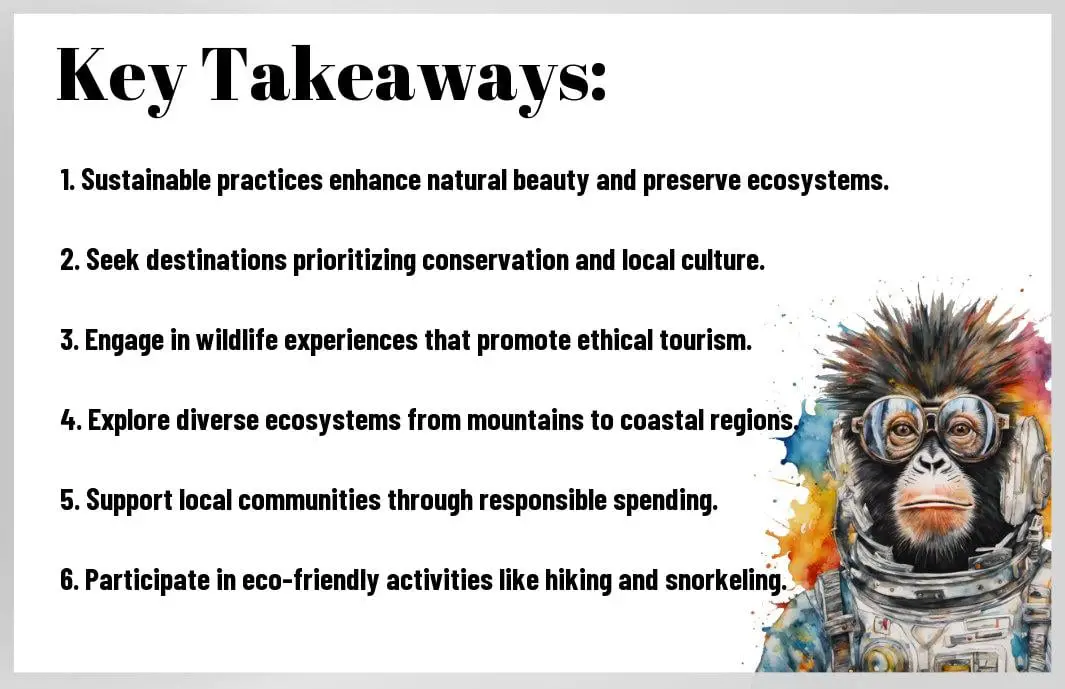You have the chance to make a positive impact on the planet while indulging in your love for travel and adventure. Eco-tourism not only allows you to explore breathtaking mountain ranges and stunning ocean landscapes but also promotes responsible travel practices that benefit local communities and conserve natural resources. In this guide, you will discover some of the best eco-friendly destinations around the world, enabling you to plan your next getaway with sustainability in mind, ensuring that your travels are as enriching for the environment as they are for your soul.
Key Takeaways:
- Eco-Conscious Travel: Prioritizes sustainability and conservation efforts in travel choices, encouraging minimal environmental impact while exploring natural beauty.
- Unique Destinations: Highlights the best mountain and ocean destinations that offer breathtaking scenery and rich biodiversity, perfect for adventure and relaxation.
- Local Culture Engagement: Encourages travelers to immerse themselves in local cultures and communities, promoting respectful interaction and support for local economies.
- Wildlife Preservation: Focuses on destinations that contribute to wildlife conservation, offering unique opportunities for wildlife observation and education.
- Eco-Friendly Accommodations: Recommends staying at accommodations that prioritize environmental practices, ensuring a smaller carbon footprint during travels.


Understanding Eco-Tourism
Definition of Eco-Tourism
The term eco-tourism refers to responsible travel that conserves the environment and improves the well-being of local people. This sustainable form of tourism focuses on experiencing the natural beauty and cultural heritage of a destination while promoting conservation efforts and minimizing your ecological footprint. Unlike traditional tourism, eco-tourism encourages you to engage with the ecosystem in a way that leaves minimal impact while facilitating economic benefits for the local community.
As you explore an eco-tourism destination, you’ll likely find opportunities to partake in educational experiences that inform you about biodiversity and conservation efforts. This deeper understanding can foster a sense of connection to the environment and motivate you to be an advocate for sustainability, even after your trip ends.
Principles of Sustainable Travel
With eco-tourism, the key principles revolve around sustainability and respect for the environment and local communities. It urges you to minimize waste and conserve energy while traveling. Sustainable travel practices may include choosing eco-friendly accommodations, using public transportation instead of rental cars, and participating in activities that benefit conservation and local cultures, such as guided tours led by indigenous communities.
Moreover, sustainable travel promotes awareness of the effects of tourism on the environment and acknowledges the necessity to protect it. By prioritizing community involvement, you can help ensure that local cultures are preserved and that wildlife habitats remain intact. Your travel decisions can have a significant impact, promoting a more equitable and sustainable approach to tourism that benefits both visitors and hosts.
Principles of sustainable travel also emphasize the necessity for you to support businesses and organizations that advocate for environmental preservation. By choosing eco-friendly products and services, you not only enjoy authentic experiences but also contribute to the local economy in a meaningful way. This commitment to sustainability enhances your travel experience, allowing you to connect with nature and local communities in an informed and respectful manner.
Benefits of Eco-Tourism
With eco-tourism, you are not just benefiting financially from unique travel experiences; you also contribute to the preservation of natural environments and cultural heritage. By visiting eco-friendly destinations, you help support conservation initiatives and provide financial resources to those who work tirelessly to protect fragile ecosystems. Your travel choices can directly impact initiatives focused on wildlife preservation, habitat restoration, and environmental education.
Furthermore, eco-tourism provides you with the opportunity to create lasting memories through immersive experiences. You’ll engage with nature, participate in hands-on conservation efforts, and learn from local cultures. Such experiences enrich your understanding of the world while fostering a sense of responsibility toward the environment. The more you learn, the more empowered you become to make sustainable choices, both as a traveler and upon returning home.
Traveling with an eco-tourism mindset allows you to explore the planet ethically, promoting practices that ensure its beauty and diversity for generations to come. You can feel good knowing that your travel choices contribute not only to your own enjoyment but also to a larger global effort to preserve the planet. Embracing eco-tourism can lead to personal growth and societal change, both of which are invaluable in today’s rapidly changing world.
The Importance of Choosing Responsible Destinations
Clearly, choosing responsible destinations for your eco-tourism adventures is crucial not just for your experience, but also for the well-being of local communities and the environment. When you select places that prioritize sustainability and conservation, you contribute positively to the areas you visit. This conscious choice can lead to lasting benefits for both the ecosystems and the people who call these destinations home, aligning your travel habits with the growing movement towards ethical exploration.
Eeconomic Impact on Local Communities
Communities that rely on tourism often face a delicate balance between economic growth and cultural integrity. By choosing responsible destinations, you help ensure that your travel dollars support local enterprises rather than large multinational corporations. This means you are likely to see local businesses thriving, which can lead to job creation and investment in community services. Your choice of destination can contribute to the stability of economies, allowing residents to maintain their traditional ways of living while benefiting from increased tourism revenues.
Moreover, responsible tourism encourages communities to invest in sustainable practices that can have a ripple effect throughout the region. Your decision to patronize workshops, guided tours, and locally-owned accommodations ensures that locals reap the financial rewards of their cultural and natural resources, fostering a healthier economy that prioritizes long-term, sustainable development over short-term profits.
Environmental Conservation Efforts
With the increase in eco-tourism, many destinations are adopting measures to protect their unique natural landscapes. Sustainable practices, such as the establishment of protected areas, wildlife conservation programs, and recycling initiatives, can significantly enhance your travel experience while safeguarding the environment. When you choose to visit these locations, you actively participate in preserving the beauty and integrity of the ecosystems you marvel at, ensuring that they remain for future generations to enjoy.
Importance of environmental conservation cannot be overstated, as it addresses the critical need to balance human activity with the health of the planet. By selecting eco-friendly destinations, you support conservation efforts that not only protect wildlife but also promote biodiversity. Your involvement can help empower local communities, providing them with the necessary resources and incentives to maintain the natural beauty that attracts visitors like yourself.
Cultural Preservation and Awareness
Any mindful traveler understands the importance of cultural preservation when exploring new destinations. By opting for responsible tourism, you engage with and support local customs and traditions, rather than contributing to their erosion. This means that your journey can help promote a deeper understanding between tourists and residents, fostering a greater appreciation for the unique cultural heritage that defines each locale. In turn, this can enrich your travel experience as you immerse yourself in authentic interactions and gain insight into the lives of the people you encounter.
Understanding the significance of cultural preservation can transform your travel perspective. You have the opportunity to learn from local traditions, participate in community events, and support artisans, ensuring that their crafts and practices endure over time. By being an informed traveler, you can contribute to the richness of humanity’s shared heritage while creating memories that go beyond mere sightseeing, enriching both your life and the lives of those you interact with on your journey.
Top Mountain Eco-Tourism Destinations
Now, launching on an eco-tourism adventure allows you to connect with nature while supporting conservation efforts. When seeking out the best mountain eco-tourism destinations around the globe, consider the unique landscapes and ecosystems each has to offer. If you’re interested in exploring more about green travel opportunities, check out The Best Destinations for Ecotourism in Latin America. Here are some exceptional mountain regions that not only promise breathtaking vistas but also commitment to eco-friendly practices.
The Rocky Mountains, USA
For your next eco-adventure, the Rocky Mountains in the United States serve as a stunning backdrop for eco-tourism. Spanning from Canada to New Mexico, this majestic mountain range offers an array of outdoor activities like hiking, wildlife viewing, and sustainable camping. The region is home to a variety of national and state parks that prioritize conservation while allowing you to immerse yourself in nature, making it a prime destination for eco-tourists.
In addition to the endless outdoor activities, the Rocky Mountains have a rich cultural heritage worth exploring. Numerous Indigenous communities are native to this area, and many offer guided eco-tours that provide insights into their traditions, sustainable practices, and the natural surroundings. So, by choosing to visit this region, you’re not only enjoying its beauty but also supporting local cultures and conservation efforts.
The Andes, South America
Andes mountain range is a dramatically beautiful region that stretches across seven South American countries. Here, you’ll find stunning landscapes that vary from snow-capped peaks to lush rainforests, making it an incredible eco-tourism destination. You have the chance to launch on a variety of activities, from trekking the famous Inca Trail to visiting flourishing ecosystems like the cloud forests of Colombia.
Aside from the natural allure, the Andes also boast a rich biodiversity; you’ll encounter countless endemic species that call this region home. Local communities often engage in sustainable farming and tourism initiatives, allowing you to directly contribute to their economy while enjoying the unparalleled beauty of the mountains.
With remarkable geological formations and cultural richness, the Andes are truly a must-visit for eco-tourists. Whether you decide to explore the ancient sites left by the Inca or traverse the natural parks, this region promises not only adventure but also a meaningful experience in conservation.
The Himalayas, Asia
America’s fascination with the majestic Himalayas draws visitors from around the globe, eager to experience its towering peaks and spiritual locales. This awe-inspiring mountain range, which includes some of the highest peaks on earth, offers an array of eco-tourism opportunities. From trekking routes offering breathtaking views of iconic mountains like Everest and K2 to engaging with local communities practicing sustainable agriculture, the Himalayas cater to adventurous eco-conscious travelers.
Understanding the delicate ecosystems of the Himalayan region is vital for your eco-tourism adventures. While trekking or exploring, it’s important to respect the local environment, ensuring you’re minimizing your impact. Engaging with local guides can enhance your experience, providing insights into the flora and fauna as well as the ongoing conservation efforts that seek to protect these sensitive mountain environments.
The Alps, Europe
Alps region is synonymous with stunning landscapes and outdoor adventure, making it an exceptional destination for eco-tourism. Covering several countries including Switzerland, Austria, and France, the Alps offer an array of eco-friendly activities, from hiking and biking to snow sports in the winter months. Many resorts here are dedicated to sustainable practices, employing green technologies to minimize environmental impact.
Destinations such as the Swiss National Park or the stunning lakes in the Dolomites provide opportunities for you to engage with nature while also educating yourself on local conservation efforts. The blend of rich cultural heritage alongside stunning natural beauty makes the Alps a versatile destination for eco-conscious travelers.

Best Ocean Eco-Tourism Spots
Not all travel destinations are created equal when it comes to eco-tourism, especially those that immerse you in the vibrant wonders of the ocean. Whether you’re drawn to coral reefs or unique ecosystems, there are countless stunning locations waiting for your exploration. Here are some of the best ocean eco-tourism spots you shouldn’t miss.
The Great Barrier Reef, Australia
Spots like the Great Barrier Reef are iconic and necessary for anyone passionate about marine conservation. As the world’s largest coral reef system, it stretches over 2,300 kilometers and is home to a dazzling array of marine life. You can snorkel or dive among the colorful corals, interact with playful dolphins, and witness the remarkable biodiversity that thrives in this UNESCO World Heritage site. It’s a paradise for eco-conscious travelers who can engage in responsible exploration while helping to protect this fragile ecosystem.
Furthermore, several eco-friendly tour operators specialize in minimizing environmental impact while still providing you an unforgettable experience. By choosing a sustainable option to tour the reef, you’re not only ensuring that your visit leaves a minimal footprint but also supporting local conservation efforts that are crucial to the reef’s survival.
The Galapagos Islands, Ecuador
With its unique biosphere and wealth of wildlife, the Galapagos Islands are often hailed as a living laboratory of evolution. As you traverse the archipelago, you’ll be enchanted by the diversity of species both on land and in the waters, many of which are found nowhere else on the planet. Guided eco-tours allow you to experience close encounters with sea lions, giant tortoises, and marine iguanas while ensuring that your visit contributes to the preservation of these remarkable ecosystems.
Plus, as you explore the Galapagos, you’ll find that many local operators are committed to responsible tourism practices. This includes measures to limit visitor numbers in certain areas, promote sustainable activities, and educate travelers about local conservation efforts. Your visit can directly support these initiatives and make a positive impact on the islands’ delicate environment.
The Maldives, Indian Ocean
Maldives boasts a breathtaking seascape that’s perfect for eco-tourism enthusiasts. Famous for its crystal-clear waters, white sandy beaches, and luxury resorts, the Maldives also delivers exceptional opportunities for responsible travel. Many resorts have adopted eco-friendly practices, such as coral gardening programs and sustainable seafood sourcing, enabling you to enjoy your visit without compromising the environment.
In addition, various marine conservation programs allow you to actively participate in preserving the delicate ecosystems that flourish beneath the waves. Activities such as turtle conservation and reef restoration not only enhance your experience but also support meaningful conservation efforts that benefit local biodiversity.
Costa Rica’s Pacific Coast
Any eco-tourist will find Costa Rica’s Pacific Coast captivating, blending pristine beaches, lush rainforests, and vibrant marine life. The region is recognized for its commitment to sustainable tourism, making it an ideal destination for travelers who want to protect and enjoy nature simultaneously. From tranquil coastal towns to lively national parks, opportunities for eco-adventures abound—you can go snorkeling, hiking, or surfing while supporting local economies.
Best of all, choosing eco-friendly accommodations and activities enhances your experience further. Numerous lodges and tour companies prioritize sustainability, ensuring that each of your experiences contributes to the preservation of this beautiful region. You can enjoy nature’s splendor while knowing that your travels promote conservation efforts in Costa Rica’s treasured environments.
Sustainable Activities to Enjoy
Despite the modern inclination towards convenient travel, eco-tourism thrives on your ability to connect authentically with nature while minimizing your ecological footprint. Incorporating sustainable activities into your adventures is not just a way to enrich your experience but also a means to contribute positively to the environment and local communities. From hiking to experiencing wildlife up close, the following sustainable activities will enhance your travel while preserving the beauty of our planet.
Hiking and Trekking
Hiking offers you a unique opportunity to immerse yourself in stunning landscapes while practicing sustainable tourism. Whether you’re exploring verdant forests, rugged mountain trails, or coastal paths, each hike gives you the chance to appreciate the local flora and fauna. You can expand your knowledge about the ecosystems you’re trekking through and witness first-hand the importance of preserving these natural environments. Make sure you choose well-marked trails, ideally those that are maintained by local organizations committed to sustainability.
As you lace up your hiking boots, remember to follow the Leave No Trace principles. Staying on designated paths, carrying out your trash, and avoiding the disturbance of wildlife will ensure that your footprint is minimal. By being a conscious hiker, you are not only safeguarding nature but also enriching your journey with the understanding that it is possible to traverse these breathtaking landscapes without compromising their integrity.
Snorkeling and Diving
The underwater world is a breathtaking realm that presents endless opportunities for adventure while also demanding your respect and responsibility. When you partake in snorkeling and diving, you gain insight into delicate marine ecosystems, witnessing colorful reefs and the diverse creatures that inhabit them. To make your experience sustainable, seek out operators who prioritize reef conservation and set policies against harmful practices like feeding fish or touching sensitive organisms.
Snorkeling excursions can be designed to promote education about marine conservation and the importance of ecosystem protection. You can also influence your experience by opting for guided tours that limit group sizes, ensuring that the disturbances to underwater life remain minimal. You’ll leave not just with memories of enchanting beauty, but also a sense of urgency towards protecting these vital habitats.
Snorkeling allows you to glide through crystal-clear waters teeming with life, making it an ideal introduction to the underwater wonders without the need for extensive training. You can explore naturally rich environments like coral reefs or kelp forests, often with little more than a mask and fins. Just remember to snorkel responsibly, respecting marine life and complying with guidelines set by local conservation efforts.
Wildlife Safaris and Tours
One of the most exhilarating and responsible travel activities you can engage in is participating in wildlife safaris and tours. By observing animals in their natural habitats, you can gain a deeper appreciation for biodiversity and the delicate balance of ecosystems. Look for eco-friendly safari operators that prioritize animal welfare, ethical tourism practices, and contribute to local conservation initiatives. This way, your wildlife adventures will not only be memorable but will also support the preservation of the environments you explore.
Moreover, joining guided tours with knowledgeable ecologists or conservationists can significantly enhance your experience. These experts not only share fascinating insights into the behaviors, habitats, and conservation challenges of wildlife but also enable you to witness how tourism can be leveraged as a powerful tool for conservation and education. By participating in these tours, you help raise awareness about the importance of protecting the natural world.
It’s crucial to ensure that your safari choices foster sustainable practices, such as leaving minimal footprints and actively supporting conservation efforts. By choosing to participate in these wildlife tours, you are contributing to the preservation of habitats and providing economic benefits to local communities that rely on sustainable tourism for their survival.
Camping and Eco-Lodges
Safaris aren’t the only way to connect deeply with nature—camping and staying in eco-lodges allow you to immerse yourself in the stunning panorama of your surroundings while making thoughtful choices for the environment. Tent camping, particularly in designated eco-camps that follow sustainable practices, allows you to experience nature up close while enjoying a minimal environmental impact. Many eco-lodges further elevate your trip by providing sustainable amenities, such as solar energy and locally sourced food, ensuring that your stay does not exploit the natural resources around you.
When you choose to camp or stay in an eco-lodge, consider the environmental practices in place. Opt for places that promote wildlife conservation and limit their footprint, offering unique insights into the areas they inhabit. These establishments often contribute to local conservation projects, ensuring that the natural beauty you enjoy will continue for generations to come.
Another advantage of camping and eco-lodges is that they often provide you with a chance to engage with local communities. Many eco-lodges incorporate cultural experiences, allowing you to connect with native customs while promoting sustainable development. This authentic interaction enriches your travels and enhances your understanding of how communities coexist with the environment.

How to Be a Responsible Eco-Tourist
After deciding to begin on an eco-tourism adventure, it’s crucial to understand how you can minimize your environmental impact while maximizing your experience. Being a responsible eco-tourist not only enhances your travel experience but also helps promote sustainability and conservation efforts in the regions you visit.
Supporting Local Businesses
The best way to ensure your travel positively impacts the destination is by supporting local businesses. When you choose to stay at locally-owned accommodations, dine at small restaurants, and shop at artisan markets, your money goes directly into the hands of the community rather than large corporations. This practice fosters economic growth and cultural preservation, allowing local customs and traditions to thrive.
Additionally, by engaging with local guides and tour operators, you gain authentic insights into the area’s history, culture, and ecology. These locals can provide you with unique experiences while also benefiting from your patronage, creating a mutually rewarding relationship that supports sustainable tourism practices.
Minimizing Waste and Energy Consumption
Energy conservation and waste reduction are important components of responsible eco-tourism. As you travel, make conscious choices to minimize the waste you generate. Bring reusable items like water bottles, utensils, and shopping bags to limit single-use plastics. Whenever possible, choose accommodations that promote recycling and energy-efficient practices.
In addition, being mindful of your energy consumption while traveling can significantly reduce your environmental footprint. Opt for accommodations that use renewable energy sources or have eco-friendly certifications. You can also save energy by turning off lights and appliances when they’re not in use, and by opting for public transportation or walking to explore new areas rather than relying on fuel-intensive vehicles.
Businesses that prioritize waste reduction often incorporate practices like composting, recycling, and offering bulk products to decrease resource consumption. By supporting these establishments during your travels, you contribute to a movement that values environmental stewardship and sustainable tourism.
Respecting Wildlife and Natural Habitats
Natural ecosystems are fragile, and your presence can have both positive and negative effects. It’s important to educate yourself about the local wildlife and to respect their habitats. For instance, maintain a safe distance from animals, refrain from feeding them, and avoid disturbing their natural behavior. Walking on marked paths, rather than trampling through vegetation, helps protect ecosystems from damage.
In addition, following guidelines set by local conservation efforts not only protects wildlife but enhances your experience. Many destinations offer educational programs that teach visitors about the local environment and the significance of preserving it for future generations. Engaging in these initiatives helps you understand and appreciate the delicate balance within ecosystems.
This respect for wildlife and natural habitats extends to all aspects of your travel. When you purchase souvenirs or engage in activities, ensure that they are ethically sourced and do not negatively impact local ecosystems or endangered species.
Volunteering and Giving Back
Supporting local communities goes beyond financial transactions; volunteering your time and skills can be a rewarding way to give back during your travels. Look for opportunities to assist with conservation efforts, community projects, or environmental initiatives that align with your interests. Whether it’s planting trees, participating in beach clean-ups, or helping in local schools, your involvement can leave a lasting positive impact.
Furthermore, engaging with local NGOs or volunteer organizations allows you to connect with community members, providing you with richer experiences and deeper understanding of the culture and challenges faced by locals. It’s a meaningful way to contribute positively to the places you visit, creating a sense of goodwill and camaraderie.
Understanding the needs of local communities can help you choose the right projects to volunteer for. By doing some research ahead of time, you can ensure that your efforts genuinely benefit those you aim to support, promoting sustainable development and community empowerment.
Final Words
From above, it’s clear that eco-tourism offers you a unique opportunity to immerse yourself in the stunning beauty of both mountain and ocean destinations around the globe. By choosing sustainable travel options, you not only enhance your own experience but also contribute positively to the environments and communities you visit. Whether it’s hiking through the lush green canopies of the Himalayas or kayaking alongside vibrant marine life in the Caribbean, each journey empowers you to appreciate the Earth’s diverse ecosystems while minimizing your carbon footprint.







